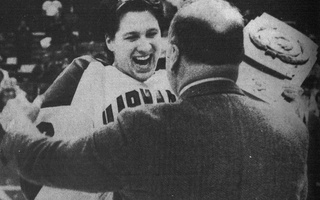“On Comedy” is an eight-part, weekly series for the Crimson’s blog. In it, I’ll be using relatively recently released comedy specials—all can currently be accessed on Netflix—as a medium to discuss various aspects of stand-up comedy that are of interest to me. These are not reviews, although my position on each comic will be clear by the end of each week. If this interests you, dear reader, please read on.
If I may provide a disclaimer, the series is written in a mildly satiric voice—both self-satire and a satire of the voice of a critic. However, the series itself is not satire. The following pieces are—I hope—more illuminating than obfuscating and more thought-provoking than tiresome. But perhaps, if one is to take a lesson from the generations of failed comics that made modern comedy possible, we don’t always get what we hope for.
This week, I would like to talk about Norm Macdonald. He is a particularly wonderful comic; his recent special, “Hitler's Dog, Gossip, and Trickery,” is shockingly brilliant. In the coming weeks, I will be discussing Katherine Ryan, Iliza Shlesinger, and Sarah Silverman (covered in weeks three, four, and eight respectively).
Macdonald does not have the overt ambition of Maria Bamford (covered in week five), nor does he have the cool charm of Deon Cole (week two) and, to a certain degree, Hasan Minhaj (weeks six and seven). But listen closely—underneath his intoxicated-sounding voice (he doesn’t drink) and thrown-together set list is the mind of a genius.
Many comedians, I believe, are restrained by a certain guiding principle concerning their approach towards an hour-long set: Their hour must cohere. Jokes are composed to flow from one line to the next, transitioning smoothly and—hopefully—illuminating something about the previous bit through their juxtaposition. Sets have overarching themes, cohesive ideas that link jokes together. Some sets will be kind enough to leave the audience with a moral or a principal philosophical tenet that the audience can take home and share with their family and friends.
Macdonald’s special is an exercise in subverting cohesion. Transitions are rare and bizarre. There is no moral. His self-stated central themes are “gossip and trickery”—themes that have little explicit bearing on the special (more on this later). His subversion of those standards of modern comedy, however, is subtly ambitious. He is not breaking the rules to shove his subversion in your face—à la Bamford—he is breaking the rules to allow the simplest pleasures of his comedy to shine.
“It’s very, very hard, not lying. Because you want people to like you—you know what I mean. All kinds of reasons to lie. I’ve thought of a way of not lying, and I’ll tell it to you. You can tell the truth, word for word—absolutely true—but when you do it, you use a sarcastic accent. So I’ll give you an example. So at dinner your wife goes, ‘I saw at dinner you were looking at my sister. You’re not attracted to my sister.’ And then you say, ‘Oh yes, I’m attracted to your sister.’”
The joke devolves from there (“devolves” is meant in the best sense of the word). There is a certain wonderful simplicity to the bit: It’s simply repurposing a sarcastic voice. That’s the heart of Macdonald’s creativity. He rejects the ostentatious in favor of brilliantly refashioning a simple concept: sarcasm and lies. He’s the comedic equivalent of a chef paring down the complexity of ingredients on his menu to allow the products of spring to sing. It is a blindingly modern approach.
With that said, kind reader, it is a bit comic how he frames his work. “Nothing of what I’ve said is of substance,” he tells us. “Most of my act is just gossip and trickery.” Perhaps the modest artist should never be taken at his word. Even his silliest bits—one of his opening jokes is about suffocation from autoerotic asphyxiation—are deeply sensitive meditations on death and parent-child relationships. I do not know if Macdonald is even aware of some of the subtle layers in his comedy. Or, for that matter, if he would approve of this piece of criticism. He’s just telling jokes. But there is a subtle depth of brilliance to his bits that should be recognized, intentional or not. (Tangentially, I tend to believe that Macdonald is, at least, subconsciously aware of the depth of brilliance in his comedy. His title is but a piece of false modesty.)
There’s a certain aspirational wonder in this. His jokes don’t require overbearing setups and pyrotechnics (no offense intended towards Kevin Hart’s “Let Me Explain”). Macdonald’s comedy is drawn from the implicit impact of personal experience—it is grounded in the nature of human interaction, human interaction that one must have to formulate the ethos of Macdonald’s jokes—but it is not explicitly personal. It’s not derived from specific stories about an unattainably interesting life (again, none intended towards Hart—he is brilliant in his own right). Thus each of us, in the right moment, and with the right creative inspiration, could create what Macdonald has wrought.
Witnessing the creation of comic genius, fashioned from so few ingredients, gives—if I may say it—hope. Hope that one day, perhaps, I’ll have a singular idea that approximates the brilliance of what Macdonald has in some moments in his special. (I hope to be modest: I know that the day has not come.) Witnessing Macdonald gives one hope that the potentiality of creation is within each of our souls. It gives us enough hope, dear reader, to dream.
That is, perhaps, the highest form of comedy: The kind of comedy that reminds us of what we can be.
—Staff writer Aziz B. Yakub can be reached at aziz.yakub@thecrimson.com.
{shortcode-524383c8f7d9e0cb6fb99513366938d9154d757f}
Read more in Arts
HubWeek Symposium Encourages Looking InwardsRecommended Articles
-
THE STAGE.BOSTON MUSEUM. - "The Humbugs," which was produced at this house on Monday evening, is a clever adaptation by Mr.
-
Ladies "Fail to Register" on Jokes Written in Golf Jargon Says Frank Craven--To "Stick to" His Drama Form Comedy"Tragedy has no appeal to me, comedy is my trade, and I intend to stick to that form of drama",
-
 Lane MacDonald ’89: Olympian, Harvard Hockey Star, Investor
Lane MacDonald ’89: Olympian, Harvard Hockey Star, Investor -
 Seeking Political Relief: Comedy on Campus
Seeking Political Relief: Comedy on Campus -
 On Comedy: The Comic as a Motivational Speaker in Iliza Shlesinger’s ‘Confirmed Kills’
On Comedy: The Comic as a Motivational Speaker in Iliza Shlesinger’s ‘Confirmed Kills’













